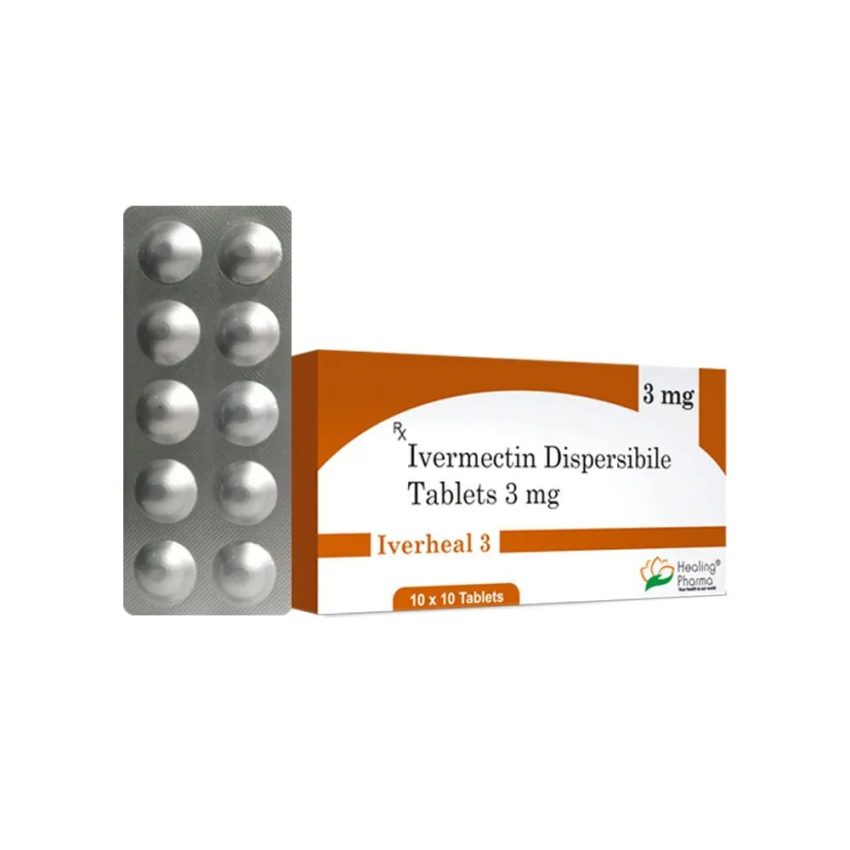Iverheal 3 reduces the severity and duration of these outbreaks. It speeds up the healing process, stops new sores from forming, and relieves pain and itching. This medication may also help to shorten the duration of pain after the sores heal.
What are the Iverheal 3 medications?
Iverheal 3 is used to treat infections caused by specific viruses. It is used to treat cold sores around the mouth (herpes simplex), shingles (herpes zoster), and chickenpox. This medication is also used to treat genital herpes outbreaks. Iverheal 3 is used to help reduce the number of future outbreaks in people who have frequent outbreaks. Iverheal 3 is an antiviral medication. It is not, however, a cure for these infections. Even between outbreaks, the viruses that cause these infections remain in the body. Iverheal 3 can also reduce the risk of the virus spreading to other parts of the body and causing serious infections in people with weakened immune systems.
How to use Iverheal 3
Take this medication by mouth with or without food, usually 2 to 5 times per day, as directed by your doctor. Unless otherwise directed by your doctor, drink plenty of fluids while taking this medication.
If you are taking this medication in liquid form, shake the bottle thoroughly before each dose. Use a special measuring device or spoon to carefully measure the dose. If you use a regular spoon, you may not get the correct dose.
This medication works best when used as directed by your doctor at the first sign of an outbreak. If you postpone treatment, it may not work as well.
This medication works best when the drug level in your body is kept constant. Take this medication at regular intervals. Take it at the same time every day to help you remember.
Continue taking this medication until the entire prescribed amount has been consumed. Do not change your dose, skip doses, or stop taking this medicine without first talking to your doctor.
Inform your doctor if your condition persists or worsens.
Does Iverheal 3 have any side effects?
It is possible to experience nausea, diarrhea, headaches, or vomiting. If any of these effects last or get worse, talk to your doctor or pharmacist right away.
Remember that your doctor prescribed Iverheal 3 medication because the benefit to you outweighed the risk of side effects. Many people who take this medication have no serious side effects.
Contact your doctor right away if you have any of the following serious side effects: dizziness, drowsiness, signs of kidney problems (like a change in the amount of urine or unusual back or side pain), mental or mood changes (like agitation, confusion, or hallucinations), shaky or unsteady movement, or trouble speaking.
This medicine can sometimes cause a disorder that affects the blood cells, kidneys, and other organs and could be fatal. If you have a weak immune system, like from HIV, a bone marrow transplant, or a kidney transplant, you are more likely to get this disorder. Get medical help right away if you have any of these very serious side effects: extreme tiredness, slow/fast/irregular heartbeat, easy bruising or bleeding, a new fever, bloody or dark urine, severe stomach or abdominal pain, yellowing eyes or skin, sudden changes in vision, loss of consciousness, or seizures.
A severe allergic reaction to Iverheal 3 is uncommon. But get medical help right away if you have a severe allergic reaction like a rash, itching, or swelling (especially of the face, tongue, or throat), severe dizziness, or trouble breathing.
This is not an exhaustive list of potential side effects. Talk to your doctor or pharmacist if you have any side effects that aren’t on this list.
What should I know before taking Iverheal 3?
Tell your doctor or pharmacist if you are allergic to Iverheal 3 or if you have any other allergies. Inactive ingredients in this product may cause allergic reactions or other problems. For more information, consult your pharmacist.
Tell your doctor or pharmacist about your medical history, especially if you have kidney problems or conditions related to a weakened immune system (such as HIV disease, a bone marrow transplant, or a kidney transplant).
This drug may rarely make you dizzy or drowsy. Alcohol or marijuana (cannabis) can make you more dizzy or drowsy. Do not drive, use machinery, or do anything that requires alertness until you can do it safely. Limit alcoholic beverages. Talk to your doctor if you are using marijuana (cannabis).
This medication may occasionally cause dizziness or drowsiness. You may become dizzy or drowsy if you consume alcohol or marijuana (cannabis). Do not drive, operate machinery, or do anything else that requires alertness until you are sure you can do it safely. Limit your intake of alcoholic beverages. If you use marijuana, talk to your doctor about it.
Inform your doctor or dentist about all of the products you use before having surgery (including prescription drugs, nonprescription drugs, and herbal products).
Some immunizations and vaccinations, like varicella virus vaccines, shouldn’t be given without your doctor’s permission.
Older adults may be more sensitive to the drug’s side effects, particularly kidney problems (change in urine amount, back or side pain), dizziness, drowsiness, and mental or mood changes (such as confusion, hallucinations, or loss of consciousness).
Iverheal 3 has no effect on the spread of genital herpes. If you have herpes, don’t touch your partner when you have a flare-up or when you have symptoms. Even if you do not have symptoms, you can spread genital herpes. Use a condom made of latex, polyurethane, or a dental dam every time you have a sexual encounter. For more information, speak with your doctor or pharmacist.
This medication should be used only when clearly necessary during pregnancy. Consult your doctor about the risks and benefits.
This medication is excreted in breast milk. This medication, however, is unlikely to harm a nursing infant. Before you start breastfeeding, talk to your doctor.
What causes an overdose of Iverheal 3?
Call 911 if someone has overdosed on Iverheal 3 medicine and is experiencing serious symptoms such as passing out or difficulty breathing. Otherwise, contact a poison control center immediately. Residents in the United States can contact their local poison control center at 1-800-222-1222. Residents of Canada can contact a provincial poison control center. Overdoses can cause changes in the amount of urine, extreme tiredness, agitation, loss of consciousness, and seizures.
Notes
Do not share this medication with others.
This medication has been prescribed only for your current condition. Do not use it later for another infection unless your doctor tells you to.
Missed Dose
If you miss a dose, take it as soon as you remember. If it is near the time of the next dose, skip the missed dose. Take your next dose at the regular time. Do not double the dose to catch up.
Storage
Keep at room temperature and away from light and moisture. Do not store it in the bathroom. Keep all medications away from children and pets.
Do not flush medications down the toilet or pour them into a drain unless instructed to do so. Properly discard this product when it is expired or no longer needed. Consult your pharmacist or local waste disposal company.




